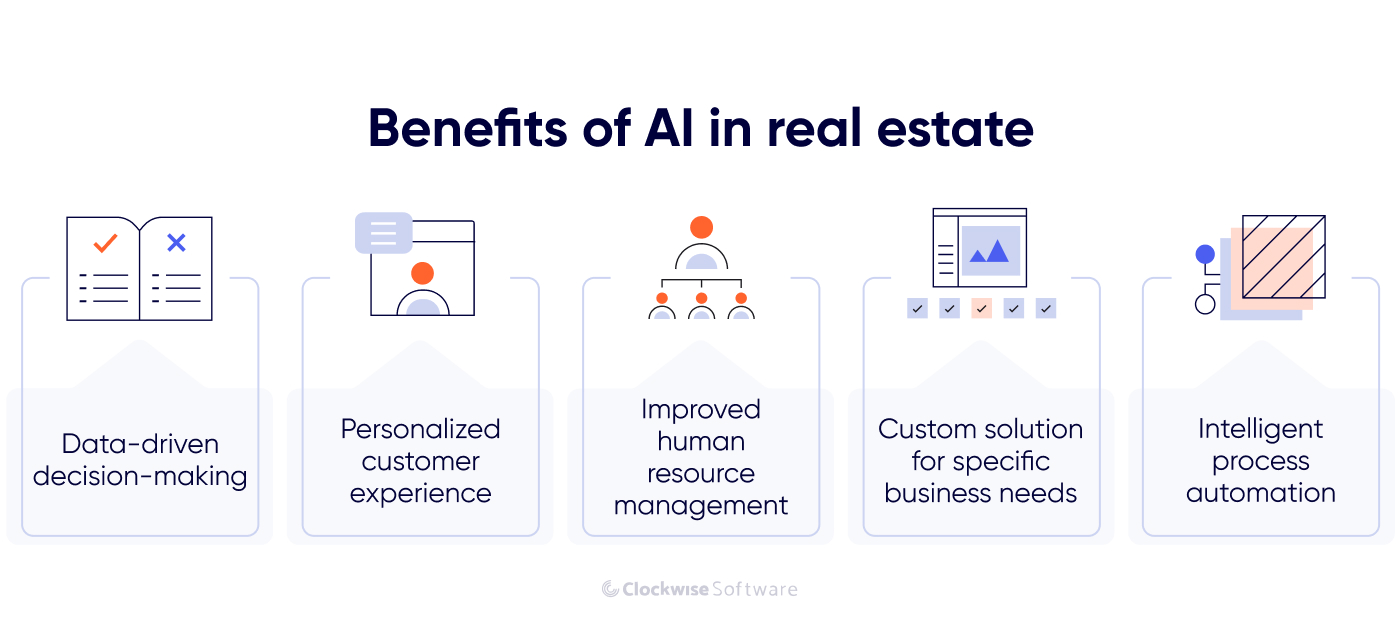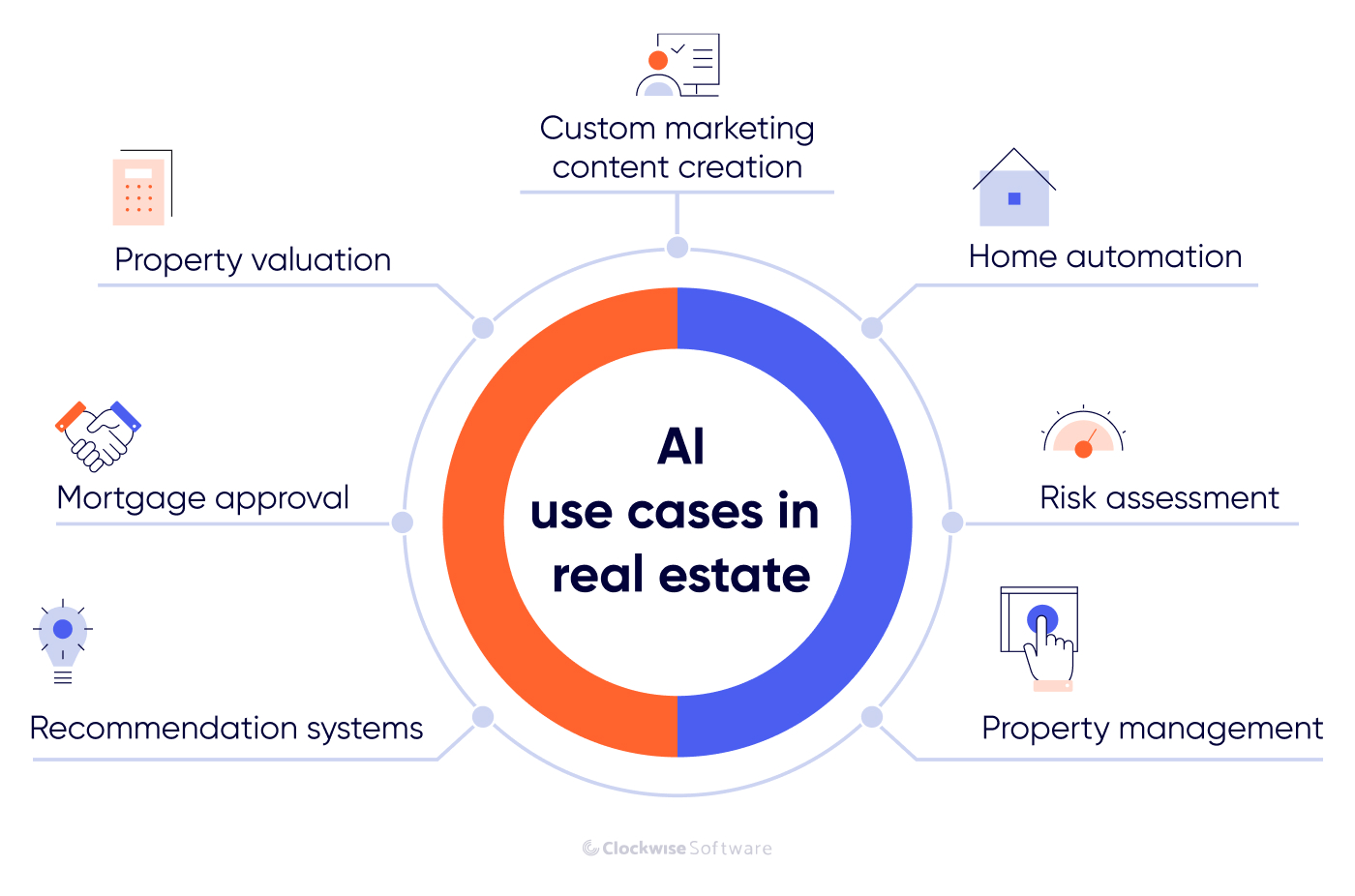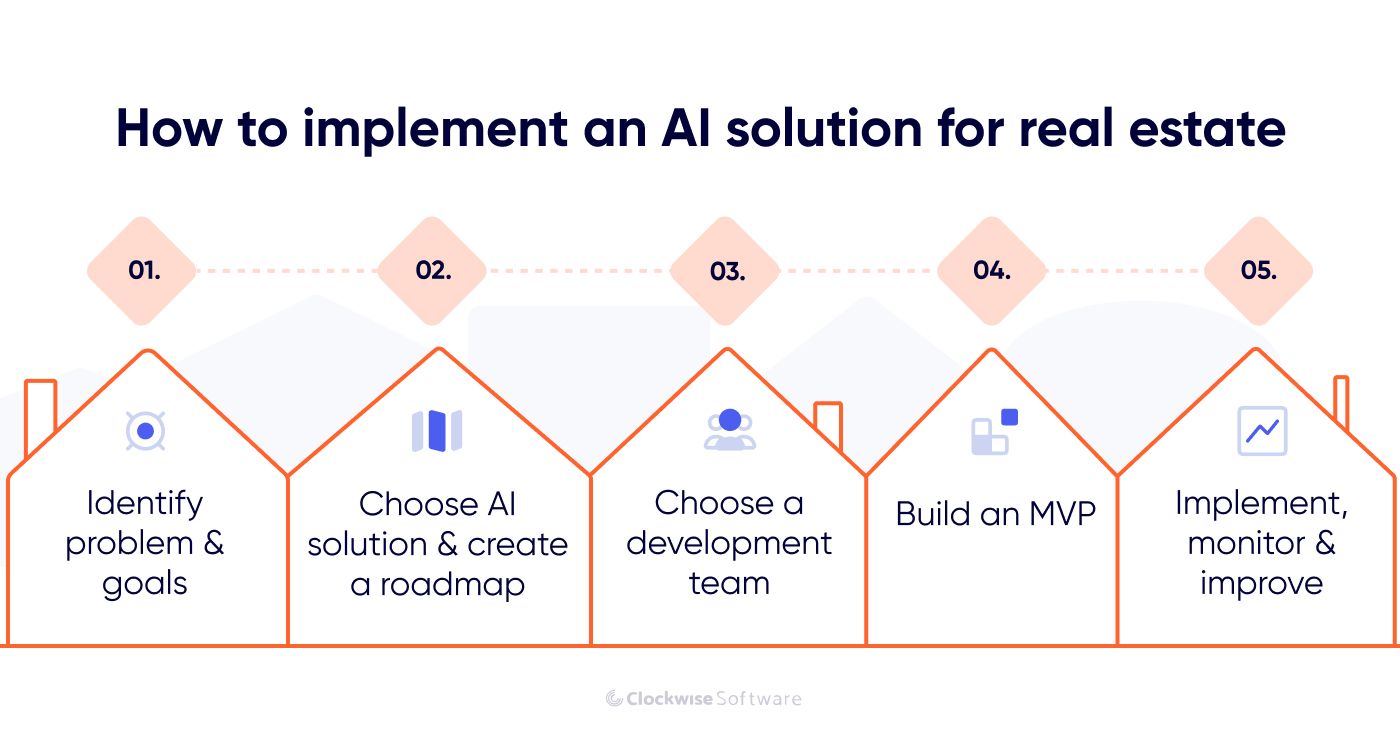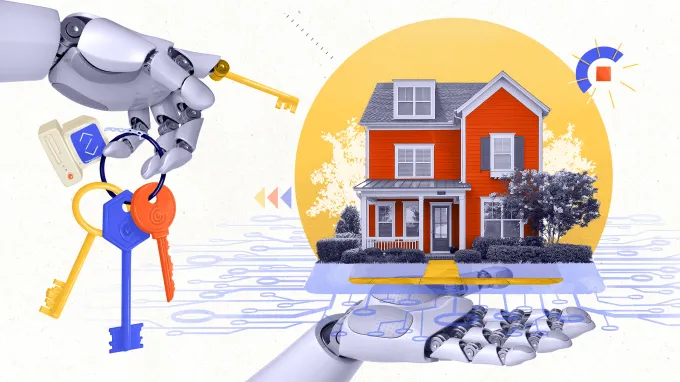AI solutions
What we do
Services
Experts in
How we work
Artificial intelligence (AI) is shaking up our world: no one can deny it. We’ve already seen its application in various areas including AI in real estate, which is a much slower-moving and more conservative industry than, for example, technology, entertainment, or marketing. And the AI trend will not go away in the near future.
To keep pace, companies are increasingly turning to AI development solutions that are tailored to their industry needs, helping them innovate processes, personalize services, and optimize operations.
The need for AI-powered solutions for real estate has emerged due to many factors. Primarily, events of recent years including the spread of COVID-19 and rapid technological changes have accelerated digitalization. And industries have had to adopt new technologies to keep up with changes in consumer behavior. As a result, even conservative industries like real estate have started to implement modern tech solutions to meet clients’ needs and expectations.
Implementation of AI solutions has not only helped to improve the customer experience but has also accelerated business processes. Old solutions used by real estate companies were unrefined and helped only with a limited number of tasks. Moreover, they had to be supervised by people, which didn’t really help to improve business productivity.
AI applications in real estate, in turn, are revolutionary. So, what does AI mean in real estate, and how can it help to solve specific real estate-related challenges? We’re here to explain.
In this article, we answer the question What is AI in real estate? You’ll find out how AI works and how to leverage its power to get an edge over your competitors. We’ll also tell you about examples of successful AI models available on the market and explain how to build your own customized solution.
What is artificial intelligence? With the active development of AI, it can sometimes be difficult to keep up with all technologies and fully understand how AI-powered solutions work. In simple terms, artificial intelligence (AI) is a technology that makes machines capable of thinking and making decisions that usually require human intelligence — and do so much faster than a human could.
AI can be best understood through various interconnected concepts that define its ability to solve different problems. Here are a few of them:
Neural networks, inspired by the work of the human brain, lie at the heart of machine learning and deep learning algorithms. A neural network includes many nodes that are interconnected and work like neurons. Together, these nodes create a set of algorithms used to process large amounts of data, identify correlations, and classify the data.
Machine learning is an approach to teaching computers by making them process large amounts of structured data. There are different ways in which machines learn, including supervised, unsupervised, and reinforcement learning. These approaches differ in their training method: labeled and structured input data along with output data for supervised learning, unstructured data for unsupervised learning, or no training data at all in the case of reinforcement learning.
By analyzing existing information or, in the case of reinforcement learning, by taking certain actions in order to achieve the best outcome, a computer finds patterns and can use them to make predictions or provide answers to questions.
Deep learning is a subset of machine learning. Its main distinction is that deep learning models use a layered neural network (a set of algorithms) for more accurate predictions and faster data processing. Deep learning models can process unstructured data, so they require less human intervention for feature extraction and hierarchy creation. As a result, such models allow for automating many complex real estate processes, such as fraud detection.
Another subfield of AI that is actively used in the real estate industry is computer vision. In simple words, this refers to the process of analyzing and understanding digital images and using the extracted data to complete specific tasks. This AI application in real estate has become popular for enabling virtual tours and scanning of properties for fast and accurate visualization.
One more technology that is incredibly helpful for real estate companies is natural language processing, which allows for teaching computers to understand natural language. As a result, computers can read, listen, and understand different information in natural language, categorize it, and extract key points and insights. If you’ve ever used ChatGPT or a similar tool, you’ve experienced natural language processing in action.
Cognitive computing is used to teach computers to simulate human behavior and thought processes in different complex situations. In this way, it is possible to significantly improve the accuracy of decisions made by a computer and minimize human intervention in the decision-making process.
Such artificial intelligence in real estate can help with numerous tasks and significantly improve business productivity. Real estate companies seeking to stay ahead are investing in tailored tech solutions. For example, by utilizing MLS software development services, agencies can develop custom platforms that integrate AI features — such as automated valuations or chatbots — directly into their listing databases.

You’re probably interested in how AI can be used in real estate to improve the experience of real estate agents, property owners, and customers. During the last several years, people have found different ways to use AI in the real estate industry. AI tools have proved effective in solving numerous problems, making it easier to buy, sell, rent, and manage residential and commercial real estate. Here are a few words about the advantages that AI real estate solutions can bring to your business.
One of the most common uses of artificial intelligence for real estate is data analysis. Processing large amounts of data and making complex analyses manually is a long and tedious process that requires great focus and a lot of time.
But thanks to AI integration services, it’s possible to greatly ease this process and avoid human errors and biased decisions.
In a matter of seconds, computers can extract, sort, and analyze data. Moreover, the use of artificial intelligence allows for monitoring real-time updates and responding faster to changes by adjusting decisions to new market conditions. The same tasks can take many hours or even days to be done by human workers, and it’s possible that decisions will still be influenced by a person’s subjective opinion. AI solutions in real estate can help you solve specific problems or answer specific requests with high accuracy, react quickly to changes, and avoid biased decisions.
The ability of AI to understand natural language and find patterns by going through vast amounts of data makes it an incredible tool for completing a variety of tasks such as property valuation, market trends analysis, and data management much faster than they could be done by a person with the use of traditional real estate software. With deep learning capabilities, AI software can learn patterns and apply them to perform tasks automatically. This can significantly improve employees’ productivity, freeing up time for employees to tackle more complicated and impactful tasks.
The capability of artificial intelligence (AI) to process natural language, give clear and precise answers, and use computer vision to understand digital images is actively used to improve the experience for rental seekers. AI in real estate means more personalized search, faster assistance with any questions via 24/7 chatbots, and even improved living conditions through home automation with IoT and AI models.
All in all, by using AI models, it is possible to provide a much better experience for customers with more convenient online tours, accurate and quick property visualization, 24/7 communication and assistance, and more.
Automated AI functions can fully cover many repetitive tasks that are done by junior specialists, such as creating property listings, screening tenants, and managing paperwork. Those tasks are usually not difficult but require a lot of time. Fortunately, with machine learning, natural language processing, and other technologies, it is possible to delegate such tasks to AI. Therefore, real estate companies can manage human resources better, lower their expenses, and empower workers to focus on high-priority tasks.
With the possibility to build their own AI software, businesses get a great opportunity to leverage the full power of artificial intelligence. AI use cases in real estate are numerous, and companies frequently have specific requests that can’t be satisfied with existing solutions. In this case, an AI tool trained on your company’s data with features tailored to solve your specific business challenges can get you a significant edge over competitors in the real estate market.

Moreover, it’s possible to make your custom AI platform a successful startup and get even more profit for your company. And even if you don’t know how to bring this idea to life, software development consulting services can help.
These are only some of the possible benefits of AI in real estate. Let’s now take a look at examples of successfully implemented AI software.

The use of artificial intelligence for real estate has drastically accelerated the property management workflow, market analysis, and other processes, helping real estate agents, investors, loan officers, and buyers. This is what Jean-Michael Paul, CEO of Acheron Capital, said in an interview for RICS:
AI can give human experts some ‘shortcuts’ to information to make their journey faster and safer and it means tremendous productivity for every single player in real estate.
Now, it’s possible to find AI-powered solutions to overcome challenges in different areas of the real estate industry, from improving the effectiveness of marketing analysis to visualizing property. Below, you will find six examples of how to use AI in real estate.
Performing a precise market analysis and having the ability to accurately predict market changes is critical for real estate agencies, investors, and others. It helps to estimate future property values and find listings that are more likely to be sold, considering various factors.
Doing this without leveraging technology takes a lot of time and effort, and the results of such valuations can be unreliable or based on insufficient information, leading to questionable outcomes. By using artificial intelligence (AI) models, it’s possible to speed up these processes, increase the accuracy of predictions, and therefore find winning properties for sale in a much more efficient way.
VeroPrecision by Veros is an automated valuation model that uses machine learning to predict housing values, assess risky scenarios (possible changes in buyer demand, the impact of environmental and economic factors, etc.), and help with property portfolio management on the whole. This AI real estate solution can significantly improve property valuations and enable real estate players to react quickly to market changes.
The use of machine learning in real estate improves experiences not only for companies but for customers as well.
Conversational AI in real estate has become a common solution to improve communication with potential buyers and tenants and provide 24/7 assistance to them. An example of a successful use case of AI in real estate is the Brenda chatbot. Laura Preston, an operator who oversees this chatbot, has commented on its ability to choose the right tone of voice with each prospect and offer properties based on a prospect’s previous searches.
When Brenda makes a mistake, the operator takes over the conversation. Then, the AI chatbot analyzes the operator’s messages and gradually learns from them to avoid the same mistakes in the future. As a result, tenants get 24/7 assistance, while the real estate company reduces expenses by hiring fewer operators and other employees who usually assist prospects.

Using AI in real estate also helps to improve property search. Real estate recommendation systems differ a lot from those used in other industries, and there are specific challenges in showing relevant listings to customers. The main reason is that it usually takes longer for a customer to make a decision about buying a property compared to buying other items, and there is typically no background information about a customer’s purchases because the average person doesn’t buy more than one or two houses over their lifetime.
That’s why real estate recommendation tools decide what listings to show to a customer based on their previous searches, viewed images, and time on a page, as well as searches of other customers with similar preferences. By implementing AI models, it’s possible to significantly improve the process of collecting and analyzing customers’ preferences and criteria and select the most suitable listings.
Redfin uses a ChatGPT plugin to make search more personalized by letting customers describe their needs and preferences and get a list of properties that are likely to satisfy their requests. On the other hand, the plugin helps sellers reach a wider audience and therefore sell properties faster.
Generative AI is used not only to assist customers in online chats. With the beginning of the pandemic, it became necessary to provide potential buyers and renters with quality visual representations of property, as it was not always possible to visit real estate in person. AI for realtors comes in handy to solve this problem.
Restb.ai, Elai.ai, Epique.ai, and other generative AI tools help to scan property images in order to identify interior and exterior features, create attractive real estate descriptions that stand out, and generate personalized videos and presentations to show a property in detail and enable virtual tours.
According to statistics by Gitnux, listings with videos receive 403% more inquiries. Using AI for real estate agents can help you significantly enhance your listings with detailed descriptions and engaging videos and attract more potential buyers.
For landlords who own several properties, it can be difficult to monitor all of them effectively. In this case, smart devices and artificial intelligence (AI) can become the ultimate solution for improving property management.
AI is used for facilitating various tasks from tenant screening to rent collection and leasing agreement updates. AI property management tools like Zenplace make it much more convenient to schedule real estate showings; communicate with tenants; set, pay, and collect rent; schedule inspections; and carry out many other tasks.
Also, AI for real estate can be useful for monitoring residential and commercial properties that have smart devices like thermostats and security systems. By monitoring real-time data from those devices, AI can effectively predict the need for maintenance, send notifications about safety and security issues (suspicious activity, smoke, etc.), and find patterns in the tenant’s schedule to optimize heating systems and electricity consumption.
In this way, the use of real estate artificial intelligence tools helps to reduce utility bills, avoid unexpected expenses on repairs, and reduce environmental impacts while providing a better tenant experience.
Artificial intelligence is also a great help in the mortgage industry. One of the major problems faced by lenders and other mortgage market players is selling mortgages. Underwriters and loan officers are frequently interested in creating mortgages for as many customers as possible without fully understanding each person’s financial situation. As a result, borrowers get mortgages they can’t afford. This leads to missed payments, lower credit scores, distrust in financial institutions, and other negative outcomes.
AI algorithms can make the risk assessment and mortgage approval process more transparent and therefore more effective. The ability of AI to analyze different types of information in seconds allows borrowers to find the best mortgage option rather than being offered the first possible one.
A great example of the use of artificial intelligence in real estate mortgage approval is the mortgage company LoanSnap. Using artificial intelligence at various stages of mortgage approval helps to get a full picture of a borrower’s money situation considering various factors, from current income to future financial goals. Based on the results of analyzing a borrower’s financial state, it’s possible to find the best mortgage option for a client.
As Karl Jacob, CEO of LoanSnap, says in an interview for CNBC,
AI is actually machines thinking and/or looking at possibilities that would not have been looked at before.

Although implementing AI models is one of the SaaS trends in 2023 and there are many solutions available, it’s possible you won’t find an AI tool that can overcome your specific business challenges. In this case, the best solution is to get custom AI software for real estate. In this section, we explain how to choose the best AI solution for you and the process of implementing it in your business.
Everything starts with the discovery phase. It’s an essential stage in AI implementation, as you need to know that your idea is actually good for your business. This stage involves a lot of research, analysis, and estimations.
The first thing to do is assess your business processes. As there are numerous artificial intelligence use cases in real estate, you need to develop a clear vision of what areas you want to improve and what particular problems you want to solve using AI. This is the first stage of startup development.
Once you decide what problems are a priority for you to solve, think about what exactly you want to achieve — set your goals and objectives. They will serve as a guide for AI implementation so you can understand which features you need and which are not useful for your business.
This is a critical stage, and if you’re not familiar with the discovery phase, it’s best to hire specialists who will analyze your business processes, identify major problems, and outline goals, objectives, and possible solutions.
The next step is to research available AI platforms and other tools on the market to determine whether you need a custom solution. Maybe there’s already a tool that meets your requirements? Research and compare different solutions, including their features and cost, and read reviews from companies who already use them. If you find an AI tool that perfectly fits your needs, that’s great! It means you don’t need to spend time developing your own solution but can just purchase the one you’ve found, implement it, and monitor how it helps you solve your business problems.
But if there is no AI for real estate software that can help you overcome your specific challenges, you should consider building a custom solution. Use the information you found during the discovery phase to create a product roadmap. A roadmap should contain information about what features you want to include, why you want to include them (how they can help you achieve your goals), what your priorities are, what your budget is, and how much time it will take to develop the AI solution.
To get a great product in the end, it’s critical to find experienced development partners. The AI software development team structure can differ depending on the project’s scope, the required tech stack, and other factors.
You can work with freelance developers if your project is relatively small. Or, if you already have in-house developers but need to hire AI experts for the project, you can partner with company that offers property management software development services and specializes in AI.

However, if you don’t have an in-house team and the scope of your project requires many different specialists, one of the best solutions is to use IT services outsourcing. Make sure to choose the right company for real estate software development, and make sure they have experience building AI software for real estate and developers with relevant technology stacks.
To reduce risks for your business and make sure your artificial intelligence (AI) real estate solution will suit your goals, it’s best to start by developing a minimum viable product (MVP).
Startup MVP development requires a lower budget than full-fledged software while providing enough functionality to understand if the product works as expected to help with your business challenges. Also, it’s not always necessary to develop a product from scratch — there are many artificial intelligence frameworks and libraries that make AI model development easier. Just make sure to agree with your development team on the project scope, core features, and other aspects important for SaaS application development.

Building an AI MVP also involves training and testing. You need to train your AI model to enable it to solve your business problems. Gather all necessary real estate data such as customers’ information, property data, and results of market research. Your model can then use algorithms to learn from this data by analyzing it, finding patterns, and improving itself with each new training round. This process needs to be supervised to detect issues and adjust the model’s architecture, increase the amount of training data, or make other necessary improvements to ensure a successful training process.
It’s also important to test your model’s performance, security, and other aspects. This is usually done by developers and involves testing new data sets to compare the results with those provided previously by the tested AI solution.
After building an MVP of your artificial intelligence model, it’s time to see how it works in real life. When you finally implement your solution, the next step is to monitor its performance. As you can see from the example of Brenda, an AI chatbot we described earlier, errors can occur after AI implementation, so the system has to be supervised by human workers to identify major problems and address them as soon as possible.
Also, it is essential to test your AI solution from time to time and collect users’ feedback to evaluate its efficiency and its impact on your business processes. Testing and collecting feedback will help you identify what needs improvements and make necessary adjustments to achieve desired results by implementing a custom AI model in your business.
Using AI in real estate is not just a trend. Leveraging the latest technologies in web development is the best way to improve the tenant experience, get better estimates from data, automate tasks that usually take a vast amount of time, and, as a result, stand out among your competitors.
To choose the right solution, you need to clearly understand what problems you want to solve and prepare a strategy for AI implementation. You can choose from existing AI-powered solutions if you find one that has everything you need to overcome specific challenges in your business. Or, if nothing on the market meets your expectations, you can build a customized AI app with all the features you need to solve your current business problems.
With your own AI solution, you can not only improve your business processes but can also turn the solution itself into a successful SaaS startup that can help other companies. If you lack expertise in artificial intelligence technologies, the best way to acquire it is to reach out to AI specialists and collaborate with them to get a top-notch solution. They will help you at all stages of AI implementation to ensure the best possible outcomes for your business.
